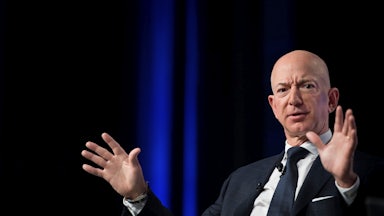Since the surprise announcement earlier this month of Bill and Melinda Gates’s impending divorce, dirt has been piling up on one side. During the brain-meltingly rich couple’s 27-year marriage, Bill “had a reputation for questionable behavior,” as one New York Times headline put it. His alleged transgressions included an extramarital affair, romantically pursuing subordinates, and maintaining warm relationships with both his money manager and Jeffrey Epstein, even after both had been accused of sexual impropriety—and even despite Melinda’s concerns, as unnamed sources emphatically note.
An anonymous member of #TeamMelinda also opined on the split to People: “They’ve grown apart for a variety of reasons.… She’s more interested in women’s issues and what and who they helped with the foundation. Bill was—and is—far more interested in the business side of his life,” they said. Yet another story, in Town & Country, characterized Melinda as the more “human, humane and community-rooted” side of the Gates Foundation, their eight-figure philanthropy with operations in over 100 countries.
Taken all together, you’d be forgiven for suspecting Melinda herself might be behind some of the coverage (linked to by more than a few Twitter users with tongue-in-cheek compliments to Melinda’s P.R. Team). Nonetheless, they do have a point: While Bill’s role at Microsoft generated the couple’s obscene fortune, it was largely Melinda who laundered it, helming their image as the world’s top philanthropists—a reputation both parties seem intent on preserving even as their personal relationship dissolves. But that sterling reputation has never been justified. As Bill’s brand as a squeaky-clean, dorky do-gooder takes a well-deserved beating, it’s wise not to get too sucked in to this made-for-People soap opera of two dyed-in-the-wool plutocrats battling for brand supremacy atop a massive pile of money. This is a story without heroes.
Melinda has always been more skillful at messaging than her now estranged husband, a dynamic perhaps best illustrated by the then couple’s 2019 appearance on The Late Show With Stephen Colbert. After being asked straight up whether billionaires should even exist, a noticeably older and bumbling Bill awkwardly tripped over an answer downplaying the need for capital gains taxes, only to be gently upstaged by a cooler, more confident and telegenic Melinda: “We do believe that to whom much is given, much is expected,” she said, before discussing the need to empower women through things like wider access to mobile banking to allow them to be more autonomous.
The redirect played perfectly into the somewhat divergent feminist brand she’s cultivated in recent years: After founding a sort of incubation fund for women entrepreneurs called Pivotal Ventures in 2015, the new Ms. French wrote a widely publicized book, The Moment of Lift, in 2019 that zeroed in on so-called “women’s empowerment” as a key to global development, a sentiment she’s increasingly tilted the Gates Foundation toward in recent years. “I believe that in empowering women, you do empower everybody else,” she explained to NPR during her book tour. “She lifts up the rest of her family and her community and her society and her economy. And so, this is absolutely about lifting up women and lifting up people of color.”
But however elegantly she handled the question compared to her soon-to-be-ex, their answer to Colbert’s question was still wrong: Of course billionaires shouldn’t exist—and the fact that they do is part of why women across the world lack the power and resources to find liberation through a banking app. Even after their estimated $140 billion estate gets divvied up, Bill Gates and Melinda French will still each possess a chunk of wealth exceeding the gross domestic product of many countries. That’s an amount that simply wouldn’t be possible in a world without mind-blowing inequality.
No one couple could ever amass that much money and property without a system that rewarded already having money and property—a truth encapsulated by the cliché “you have to have money to make money.” That means that the lucky few people on earth who control resources comparable to the Gates’s possess vast power: They can invest money and make even more back without producing anything themselves, they can pay workers a pittance and hoard the profits they generate, they can charge rent to people far poorer than them and buy off the political system to keep the whole process as frictionless as possible. Every dollar that flows upward to the Bills and Melindas of the world is one diverted from the bottom.
Moreover, every dollar that ends up with Bill and Melinda Gates is a dollar denied to the democratic institutions we’ve assembled. As Rafia Zakaria observes in The Baffler: “Large billionaire-funded NGOs taking the place of governmental efforts means that the individuals who control them can function as a quasi-autocracy, where Gates, Bezos, and Zuckerberg are free to meddle in anything, forcing the world’s poorest to tolerate their megalomaniacal and stupid plans. With these crucial public-sector goods handed off to billionaires, the democratically accountable institutions that were supposed to do the job become vestigial organs, while new efforts never develop at all.”
As much as dire social problems—like famine, disease, a lack of opportunity, and everything else—are spawned by poverty, they are spawned by concentrated wealth. That makes billionaires a less than ideal fit for solving the scourges of unequal resource distribution: As sociologist Linsey McGoey put it in The New York Times, “Asking Bill Gates to fix inequality is like asking an arsonist to hose down your house after he just set it on fire. Philanthropists might have the deep pockets to fund the fire engine and water hose, but the money is coming from making our houses unlivable in the first place.”
Asking Melinda French to fix gender inequality is just as silly. She’s right that women are poorer and more oppressed than men are, particularly Black and brown women living in the global south—countries whose wealth has been extracted over centuries to fuel the markets that yielded fortunes for a select few. To “empower” women around the world demands disempowering the ultrarich and diverting resources downward, as well as into the public sector to create robust universal welfare programs—the kinds of things built by heavy progressive taxation, labor unions, and good old-fashioned class war. Of course, that would necessarily starve billionaire philanthropists of the surplus reserves they need to build their foundation empires and command the respect of a hundred outstretched hands seeking a portion of the wealth they might have been entitled to in the first place.
In the end, one has to wonder: Does Melinda Gates want her money to empower women, or does she want her reputation as a women’s empowerment thought leader to aid in the accrual of further boodle, influence, and esteem? Financing women’s entrepreneurship, after all, is no replacement for worker power. And a “good” enlightened billionaire is no replacement for a bad one.








